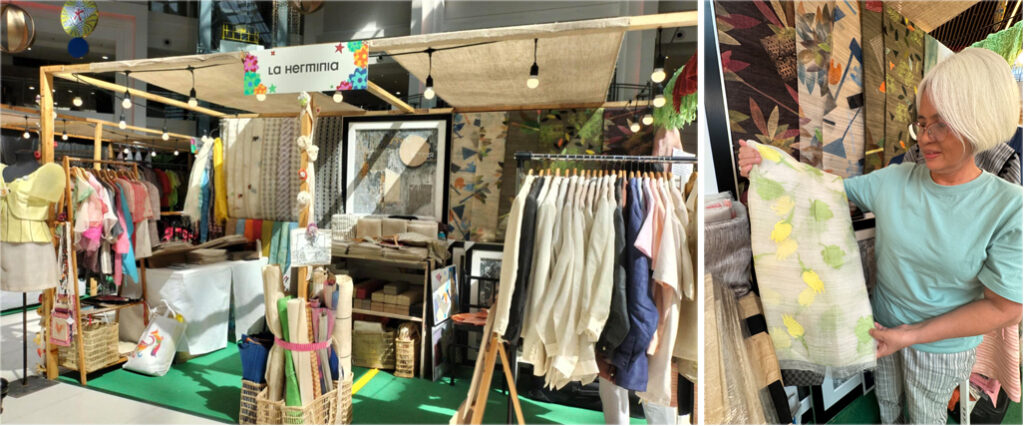Founded in the second quarter of 1996, La Herminia Piña Weaving Industry has been at the forefront of preserving and innovating traditional Filipino handwoven fabrics.
Headquartered in Kalibo, Aklan, the enterprise specializes in piña, abaca, cotton and silk combinations, creating exquisite, all-handwoven textiles celebrated for their quality and cultural significance.
The enterprise began as a family initiative when Arlyn Tumbokon’s younger brother, a civil engineer, decided to turn to entrepreneurship after being dismissed from his contractual job at the Department of Public Works and Highways (DPWH) in the region.
Inspired by Aklan’s rich weaving tradition and their mother’s expertise, her brother and his wife learned the craft under her guidance, naming their business “Herminia” in her honor.
“With just three weavers—my mother, brother and sister-in-law—we started producing textiles from pineapple leaves. It was a humble beginning, but we had faith in our craft,” said Tumbokon.

After working at the Bureau of Food and Drug Administration (BFAD) and receiving training in Germany, she returned to the Philippines and joined the family business.
“Success is not just in the fabric we produce, but in the lives we touch and the heritage we preserve,” Tumbokon said as she took charge of marketing, helping introduce Aklan’s weaving heritage to a broader audience.
Collaborations with the Department of Trade and Industry (DTI) further facilitated missions that showcased their fabrics to renowned designers, shifting the narrative that piña weaving was exclusive to Lumban, Laguna.
Legacy of innovation
What sets La Herminia apart is its commitment to innovation while honoring tradition.
Initially made of bamboo, the company’s looms were modernized through the ingenuity of Tumbokon’s brother, who developed a semi-mechanized loom capable of producing fabric up to 60 inches wide—double the standard width.
This advancement not only increased production efficiency, but also catered to the growing demand for premium fabrics among high-profile designers such as Paul Cabral, Randy Ortiz and Lulu Tan-Gan.
“Our journey began with a belief in the craftsmanship of our people and the desire to share Aklan’s weaving heritage with the world,” Tumbokon said. “By combining our traditional knowledge with modern technology, we’ve created textiles that appeal to both local and international designers.”

Their fabrics, including piña-cotton and piña-silk blends, are prized for their luxurious texture and durability. Sinuksuk, a traditional hand-embroidered design, remains one of their most intricate offerings, celebrated for its artistry and cultural value.
La Herminia’s creations have garnered accolades, including a grand prize at the 2020 HABI competition during the pandemic. The company has also been recognized internationally.
Global reach
La Herminia’s fabrics are sought after in Japan, where piña is used in traditional obi belts, and by young designers who appreciate its versatility.
Despite challenges, including a slowdown in exports to the US, the company remains steadfast, supplying both domestic and international clients.
The weaving centers in Kalibo, Tangalan and Balete, Aklan, employ nearly 90 weavers, many of whom commute from nearby towns. The weavers’ plight urged La Herminia to strive to build a dedicated weaving center for all the weavers.
By keeping production local, La Herminia provides sustainable livelihoods while preserving a craft deeply embedded in Aklan’s cultural identity.
Commitment to heritage
Now 64 years old, Tumbokon reflects on the journey of trading her government career for the family business.
“With a modest starting capital of P200,000 and a strong belief in our craft, the Tumbokon family has built a legacy that we intend to pass down to future generations. It’s not just about business—it’s about keeping the heritage of Aklan alive for the next generation,” she said.
As pioneers in HABI, the Philippine Textile Council, La Herminia continues to innovate while staying true to its roots.


